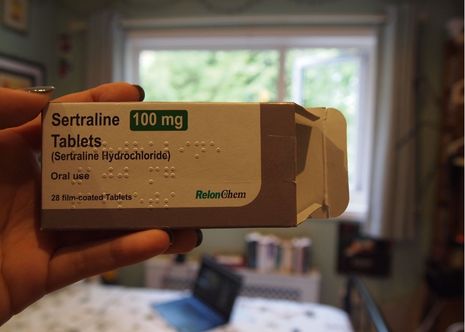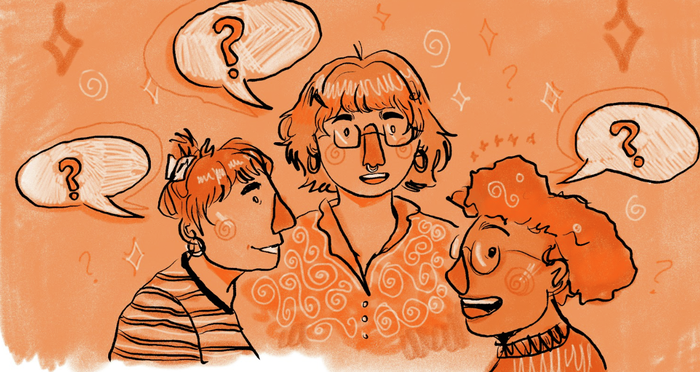Sertraline, side-effects, and the Simpsons
Heidi Atkins argues that we shouldn’t let the fear of seeking help and the stigma surrounding antidepressants deny us a better future

A lot of my life was spent thinking of depression as a big, gross, muddy swamp. It was a disgusting pool that I knew I could get out of but it was so warm, so grotesquely familiar, and would take so much energy to wade through that I resolved to stay entirely still and hope I wouldn’t sink any further. Occasionally someone would float the idea of an antidepressant rope to help pull me out. This suggestion was always met with terror. Antidepressants meant calling the GP to talk about my feelings, actually asking for help and being met by a long list of side effects as soon as I started. No, much better to stay in the swamp and hope I didn’t sink any further.
To no one’s surprise, I did sink. Alone for the first time in my life, having to navigate the quasi-adulthood of being at University, and managing a workload I had never before seen, it is not shocking that by Lent term I was at an all time low. I was unable to function and, crucially, complete essays. Like any good Cambridge student, this tipped me over the edge. Sure, depression had stopped me from showering, socialising, leaving my room, getting changed, but it had never come in between me and studying before. Amid a terror of losing precious academic validation, I tearfully called the GP: “Uh sorry, I think I’m having a bit of a breakdown, can I see someone…uhhhhh… like now please? I’m not very well.” Within an hour and a half I had my first prescription of sertraline.
“the culture of fear that surrounds antidepressants prevents people from seeking help.”
After I took my first pill, I sat on the edge of my bed waiting for my brain to start shutting down. Almost any piece of media I’ve watched that featured antidepressants contained a laundry list of negatives. Right wing pundits like Tammy Bruce, Tucker Carlson and Republican Representative Marjorie Taylor Greene have urged governments to “study SSRI’s and other factors that cause mass shootings”, their rhetoric stoking fears that antidepressants are capable of changing a person to the point that they commit mass violence. After Lisa Simpson gets prescribed them in a season 20 episode of the show, she begins to hallucinate and loses her intelligence and passions. Even my friends refer to antidepressants as an ‘extreme’ step, citing a terror that they will be changed entirely. I believed this was the end for me; gone was the Heidi of old and all that would remain was an antidepressant fuelled husk.
My first week on medication corroborated some of my fears. I was entirely checked out of what was happening around me and spent supervisions staring out of windows, trailing off mid sentence, and forgetting all normal social rules as supervisors’ names were replaced by “man”, “dude”, and in one especially awful case, “bruv”. Most awfully, though, I still struggled to get work done. Terror set in: I thought I’d have to drop out. If I couldn’t think straight, there was no way Cambridge was the place for me.
“I’ve never been better”
I sent a nervous email to my DOS asking to come and talk to her about my fears. She had taken antidepressants throughout her time at Cambridge and, for the first time, I found myself having a conversation about antidepressants that didn’t scare the shit out of me. “You’ll be fine,” she said, “you’re just going to have to find something else to motivate you rather than anxiety.” She was right, the last 18 years of my life I’d been relying on that screaming anxious voice in the back of my head to get things done. Sertraline, like most SSRIs, functions also as an anti-anxiety medication, and all I needed to do was stop allowing fear to write my essays.
Gradually, I began to adapt to my dose and my spaced out mind came back down to earth. My brain fog receded and, for the first time in a while, getting up in the morning didn’t make me cry. Depression eats away at all your interests and I’d lost my passion for my subject, but sertraline brought that back. I didn’t need fear anymore, I actually enjoyed being a nerd. Nothing was a slog anymore; I could get up, head to the library and see my friends without the weight of depression trying to drag me back to rot in bed.
In the first few weeks of being fully acclimated to the medication I was increasingly annoyed at my neurotypical friends: this is how they were feeling the whole time? Quickly, though, my annoyance switched to the rhetoric I’d been surrounded by and believed for years. I am not here to deny the very real side effects some people experience when on antidepressants; there is no ‘one size fits all’ decision for people suffering from mental illness, but the culture of fear that surrounds antidepressants prevents people from seeking help. For years of my life I have avoided antidepressants because I had been bombarded with the idea they would destroy me. I am very proud to say, though, I’ve never been better.
 News / Cambridge students set up encampment calling for Israel divestment6 May 2024
News / Cambridge students set up encampment calling for Israel divestment6 May 2024 News / Cambridge postgrad re-elected as City councillor4 May 2024
News / Cambridge postgrad re-elected as City councillor4 May 2024 News / Some supervisors’ effective pay rate £3 below living wage, new report finds5 May 2024
News / Some supervisors’ effective pay rate £3 below living wage, new report finds5 May 2024 Fashion / Class and closeted identities: how do fits fit into our cultures?6 May 2024
Fashion / Class and closeted identities: how do fits fit into our cultures?6 May 2024 Features / Cambridge punters: historians, entertainers or artistes? 7 May 2024
Features / Cambridge punters: historians, entertainers or artistes? 7 May 2024






